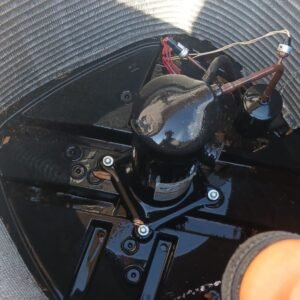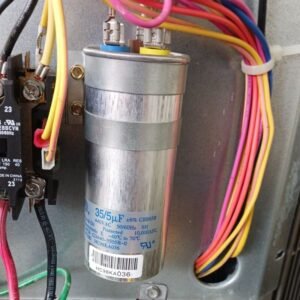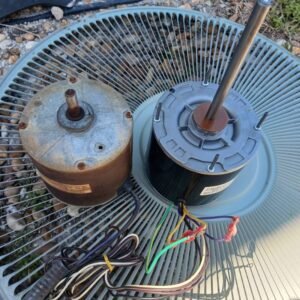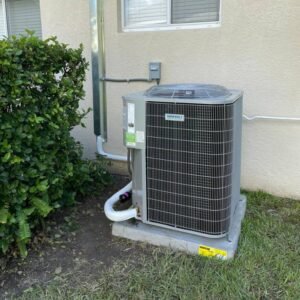How to troubleshoot your AC compressor
Air conditioning is a crucial component in many homes and offices, especially during the hot summer months. The AC compressor is responsible for compressing the refrigerant gas, which is essential for the air conditioning unit to cool the air.
However, like any other machine, AC compressors can malfunction, and it is essential to troubleshoot and fix any problems promptly to prevent further damage. In this blog post, we will discuss how to troubleshoot problems with your AC compressor.
Signs Your Air Conditioner Compressor Is Going Bad
Your air conditioner compressor is a vital component of your AC system, responsible for compressing refrigerant and circulating it through the coils to cool the air. When the compressor starts to go bad, it can lead to a range of problems, such as poor performance, higher energy bills, and even complete system failure. Here are some common signs that your air conditioner compressor is going bad:
- Strange Noises: If you hear unusual noises coming from your AC unit, such as banging, clanging, or grinding sounds, it may be a sign that the compressor is failing.
- Warm Air: If your AC unit is blowing warm air instead of cool air, it could be due to a faulty compressor. The compressor is responsible for compressing the refrigerant, which cools the air before it is circulated throughout your home or office.
- Higher Energy Bills: If you notice a significant increase in your energy bills without any changes to your AC usage, it may be due to a failing compressor. As the compressor struggles to work properly, it can consume more energy, leading to higher energy bills.
- Frequent Cycling On and Off: If your AC unit is turning on and off more frequently than usual, it may be a sign that the compressor is failing. This is because the compressor is struggling to maintain the desired temperature, causing the system to cycle on and off more frequently.
- Visible Leaks: If you notice any visible leaks around your AC unit, it could be a sign that the compressor is failing. This is because the compressor relies on refrigerant to cool the air, and if there is a leak, it can lead to a loss of refrigerant and poor performance.
- Tripped circuit breakers: If the compressor is drawing too much power, it can trip the circuit breaker and shut down the system. This can indicate an electrical issue with the compressor and should be addressed by a professional technician. Ignoring a tripped circuit breaker can lead to further damage and potentially dangerous situations.
If you notice any of these signs, it is essential to have your AC unit inspected by a professional technician as soon as possible. Delaying repairs can lead to further damage and costly repairs in the future. A technician can diagnose the problem and recommend the best course of action, whether it is repairing or replacing the compressor.

8 Steps to Follow
Some of these steps require special tools and knowledge, if at any point you feel unsafe or don’t know what to do it is best to stop and contact a licensed HVAC technician.
Check the Power Supply
The first step in troubleshooting your AC compressor is to check the power supply. Check to ensure that the AC unit is connected to a power source and that the power supply is working correctly.
If you have checked the power source and still have no power, you may have blown a fuse or a tripped breaker. If this is the case, you need to replace the fuse or reset the breaker. The fuse is found in the air handler and is usually either 3 or 5 amps. The fuse is transparent so if you see a burn mark inside, it is time to replace it. When resetting the breakers, turn the off completely and then back on. If the breaker immediately trips, you have a bigger problem like a bad compressor or other electrical issues.
If you are unsure of how to do this, it is best to call a professional.
Check the Thermostat
The thermostat is responsible for controlling the temperature in your home or office. If your AC compressor is not working correctly, it may be due to a faulty thermostat. Check to ensure that the thermostat is set to the correct temperature and that it is functioning correctly. If you have a programmable thermostat, ensure that it is set correctly and programmed correctly.
For normal operations, set the fan mode to auto, the temperature to cool, and lower it below the room temperature. A programmable thermostat changes the temperature based on a schedule, so do not be alarmed if the set temperature in your home changes randomly throughout the day.
Check the Air Filter
The air filter in your AC unit is responsible for removing dust and debris from the air. If the air filter is dirty, it can cause the AC compressor to work harder than it needs to, resulting in poor performance or even failure. Check the air filter to ensure that it is clean and replace it if necessary. If you are unsure of how to replace the air filter, consult the owner’s manual or call a professional.
Our recommendation is to use a MERV 8 or higher filter for your HVAC system and replace it monthly. However, if there are multiple people or pets in your household, you may need to replace the filter every 2-3 weeks. Additionally, if you keep your home clean regularly, you may be able to extend the lifespan of the filter. A useful tip is to check the filter when replacing it: if it is very dirty, replace it more frequently; if it is still clean, you can prolong its use for a bit longer.
Bonus: Every time you change your AC filter pour a cup of diluted white vinegar down your drain line.
Check the Refrigerant Levels
The refrigerant in your AC compressor is responsible for cooling the air. If the refrigerant levels are too low, it can cause the AC compressor to work harder than it needs to, resulting in poor performance or even failure. To check the refrigerant levels, you need to have a professional come out and do a pressure test. If the refrigerant levels are low, the technician will need to add more refrigerant.
A simple way to tell if your system is low on refrigerant is if it is frozen. This is not the only reason your system would freeze but it is very common. On the same note, your system might be low on refrigerant but not frozen.
Check the Condenser Unit
The condenser unit is responsible for releasing the heat that is generated by the refrigerant. If the condenser unit is dirty or obstructed, it can cause the AC compressor to work harder than it needs to, resulting in poor performance or even failure.
To check the condenser unit, you need to turn off the power supply to the AC unit and remove the outer cover. Once the cover is off, use a garden hose to remove any dirt or debris from the fins. If the fins are bent, you can use a fin comb to straighten them. You can clean it without removing the cover in some models and some particular cases.
Check the Capacitor
The capacitor in your AC condenser is responsible for starting the fan motor and the compressor. If the capacitor is faulty, it can cause the AC compressor to not start at all. To check the capacitor, you need to turn off the power supply to the AC unit and remove the outer cover. Once the cover is off, locate the capacitor and check to see if it is swollen or leaking. If it is, you need to replace it.
If after you replace your capacitor, the compressor or motor is not turning on get a garden hose and cool them off. They might have gotten overheated, this definitely is not a good sign for the longevity of those parts but they might last you just long enough.

Check the Fan Motor
The fan motor in your AC compressor is responsible for circulating the air. If the fan motor is faulty, it can cause the AC compressor to not work correctly. To check the fan motor, you need to turn off the power supply to the AC unit and remove the outer cover. Once the cover is off, locate the fan motor and check to see if it is working correctly. If it is not, you need to replace it.
You can check if it is spinning freely with a push of your hand, on some occasions it might start spinning the wrong way (check the way of the airflow with a piece of paper), if there is oil coming out of the motor it might be time to change it.

Call a Professional
If you have tried all the above troubleshooting steps and your AC compressor is still not working correctly, it is time to call a professional. AC compressors are complicated machines, and attempting to fix them without the proper training can be dangerous. A professional technician will have the experience and expertise necessary to diagnose and fix any problems with your AC compressor safely.
What kills an AC compressor?
There are several factors that can contribute to the failure of an AC compressor. Here are some of the most common reasons why an AC compressor may fail:
- Overheating: If the compressor is working too hard or has a problem with the refrigerant flow, it can cause the compressor to overheat. Overheating can cause damage to the compressor’s motor and internal components, leading to failure. If your compressor overheats use a garden hose to cool it down, this is not a long-term solution if it keeps happening contact a professional.
- Electrical Problems: Electrical issues such as short circuits, voltage spikes, and power surges can cause damage to the compressor’s electrical components, leading to failure. Install a surge protector on your condenser to insure against this.
- Lack of Maintenance: Regular AC system maintenance is essential to keep it running smoothly. Neglecting maintenance tasks such as changing air filters, cleaning coils, and checking refrigerant levels can lead to compressor failure.
- Age: Like all mechanical components, AC compressors have a limited lifespan. Over time, the internal components of the compressor can wear out or become damaged, leading to failure.
- Contaminants in the Refrigerant: Contaminants such as moisture, dirt, and debris can build up in the refrigerant lines and cause damage to the compressor’s internal components, leading to failure. Make sure your technician always vacuums your refrigerant lines when they are opened.
- Low Refrigerant Levels: If the refrigerant levels in the AC system are low, it can cause the compressor to work harder than it needs to. This can lead to overheating and damage to the compressor’s internal components, leading to failure.
To prevent compressor failure, it’s important to have your AC system inspected and maintained regularly by a professional technician. Regular maintenance tasks such as changing air filters, cleaning coils, and checking refrigerant levels can help keep your AC system running smoothly and prevent costly repairs. Additionally, it’s important to address any issues with the AC system promptly, before they lead to further damage and potentially expensive repairs.
How much does it cost to replace an AC compressor?
The cost to replace an AC compressor can vary widely depending on several factors, including the size and type of AC unit, the brand and model of the compressor, and the cost of labor in your area. On average, the cost to replace an AC compressor can range from $1,500 to $2,500, including parts and labor. However, the actual cost can be higher or lower depending on various factors.
For example, the cost of the compressor itself can vary depending on the brand and model. Some compressors may cost several hundred dollars, while others can cost over $1,000. Additionally, the cost of labor can vary depending on the location, the complexity of the job, and the experience of the technician.
If other parts of the AC system are damaged or need to be replaced, the cost can increase even more. For example, if the compressor failure caused damage to the condenser or evaporator coils, those may need to be replaced as well, which can add to the overall cost.
To get an accurate estimate for the cost of replacing your AC compressor, it’s best to consult with a professional technician. They can assess the situation and provide you with a detailed estimate for the cost of parts and labor.
Is it better to replace the compressor or the whole unit?
When deciding whether to replace the compressor or the whole AC unit, there are several factors to consider, such as the age and condition of the AC unit, the cost of the replacement parts, and the cost of labor. Here are some things to keep in mind:
- Age of the AC Unit: If your AC unit is older than 10 years, it may be more cost-effective to replace the whole unit rather than just the compressor. This is because older units may have other components that are nearing the end of their lifespan, which could lead to additional repairs in the near future.
- Cost of Replacement Parts: The cost of a new compressor can vary depending on the size and type of AC unit. In some cases, the cost of a new compressor may be close to the cost of a new AC unit, making it more cost-effective to replace the whole unit.
- Labor Costs: Replacing a compressor can be a labor-intensive process that requires specialized skills and tools. Depending on the cost of labor in your area, it may be more cost-effective to replace the whole unit rather than just the compressor.
- Warranty: If your AC unit is still under warranty, it may be more cost-effective to replace just the compressor rather than the whole unit. However, it’s important to check the terms of the warranty to make sure that replacing just the compressor won’t void the warranty.
- Efficiency: If you’re replacing an older AC unit, it may be more cost-effective in the long run to replace the whole unit rather than just the compressor. Newer units are often more energy-efficient, which can lead to lower energy bills and a more comfortable home.
Ultimately, the decision to replace the compressor or the whole AC unit depends on your specific situation. It’s important to consult with a professional HVAC technician to determine the best course of action based on the age and condition of your AC unit, the cost of replacement parts and labor, and your long-term goals for efficiency and comfort.

Trust The AC Therapist for Reliable AC Repair, Replacement, and Maintenance
In conclusion, the AC compressor is a critical component of your air conditioning system, responsible for circulating the refrigerant that cools the air. If you notice any signs that your AC compressor may be failing, such as strange noises, warm air, or higher energy bills, it’s essential to have the issue addressed promptly to avoid further damage and costly repairs.
Regular maintenance and inspections can help prolong the life of your AC compressor and prevent costly repairs in the future. Additionally, if you’re faced with a decision to replace the compressor or the whole AC unit, it’s important to consider the age and condition of the unit, the cost of replacement parts and labor, and your long-term goals for efficiency and comfort.
If you’re experiencing any problems with your AC system, it’s important to seek professional help from a qualified HVAC technician. The AC Therapist is a reputable company that specializes in AC repair, replacement, and maintenance. Their team of trained technicians can diagnose and fix any issues with your AC system, ensuring that it runs smoothly and efficiently. Contact the AC Therapist today to schedule a consultation and keep your home or office cool and comfortable all year round.








